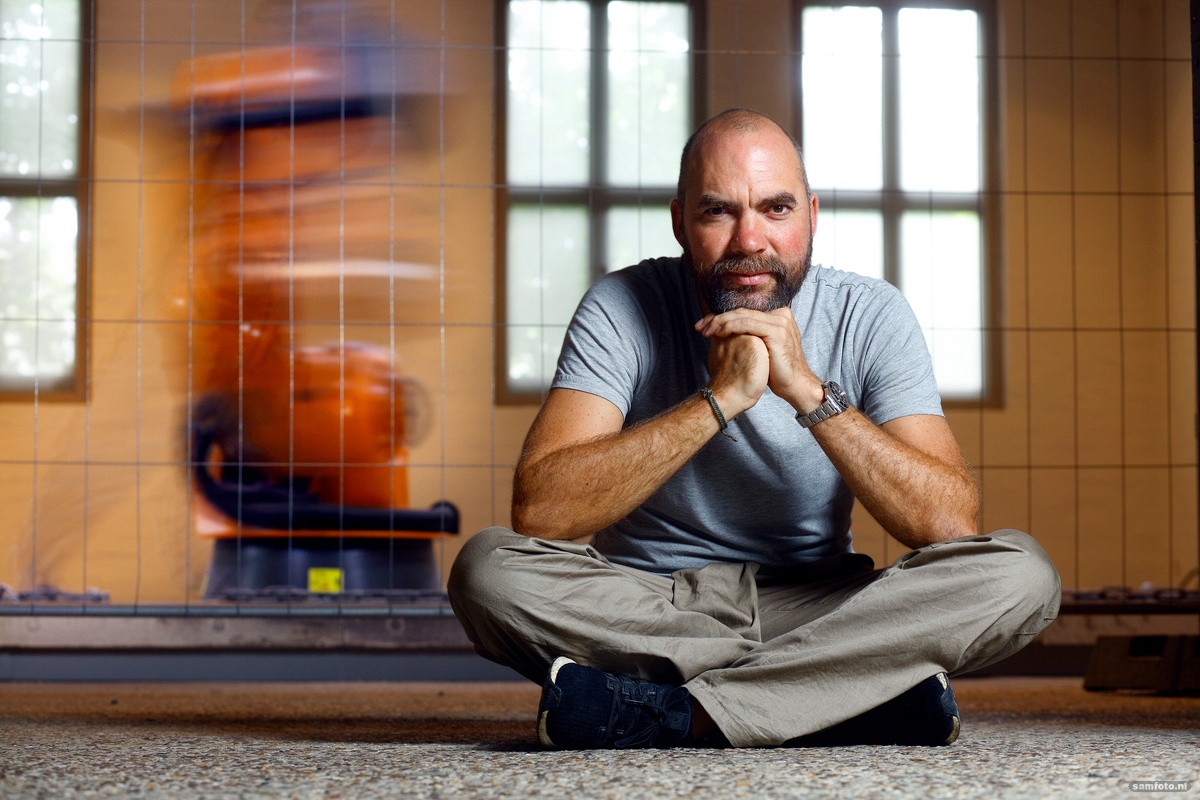TU Delft alumnus Bram Ellens decided to focus on the world of art. In his exhibition Robots in captivity he is working together with scientists, artists and philosophers.
Bram Ellens: “Almost everything is developed with an eye to turning a profit. How ethical is that, and who controls the algorithms?” (Photo: Sam Rentmeester)
- Company: Bram Ellens
- Product: Art
- Degree programme: Technology, Policy and Management
- Number of employees: 1.5 (a software programmer and a head of operations)
- Revenue: € 78,000 (after expenses € -12,000)
- In five years’ time: “It would be great if we could break even, and still be able to do this fantastic work.”
Three flip stunt cars drive non-stop against prison bars, drones buzz wildly as they flutter in a birdcage and a chained robot arm struggles hopelessly against its restraints. Thanks to high-tech hardware and software, Bram Ellens’ robots move about like caged animals. That evokes emotions among the viewers, and this is precisely the intention, as in this exhibition Ellens is investigating the relationship between man and robotics. He is both fascinated and alarmed by the emergence of artificial intelligence, which he experienced at close hand during his work in international tech companies in Silicon Valley and elsewhere. “Almost everything is developed with an eye to turning a profit. How ethical is that, and who controls the algorithms?”
‘It is confronting to experience how society regards art’
Ellens’ robots appear discarded and traumatised and they elicit feelings of pity or even fear in the viewer. This makes the exhibition a perfect living lab for the research project Acting like a robot from Utrecht University, VU Amsterdam and HKU University of the Arts Utrecht. “Here we have two PhD candidates from Prof. Maaike Bleeker’s group who are studying robot behaviour from a new perspective (art and theatre) to bring them closer to humanity.” For example, ‘Jan, an escaped AI developed by the US army’, is becoming increasingly smart by monitoring the responses of visitors in his attempt to be freed from his display case.
Besides scientists and students, Ellens is cooperating with artists and philosophers on the development of the robots. “I used to work a lot with developers on things that were not finished yet, and we do that here too, giving scope for experiment.”
The new entrepreneurship in art got Ellens thinking. “It is confronting to experience how society regards art, compared to how start-ups are regarded. Investment in internet companies is almost limitless, while in the arts you have to beg for money. It is valued totally differently. At the start of this project I applied to some cultural funds for funding, but somehow I never qualified. In the end I scraped together funding from all over the place. Through sponsoring from Husqvarna, from my own capital – I work one day a week on the Zuidas – and through trading: while looking for an industrial robot arm we found a company selling six of them from a liquidation. We bought these and sold them on, in Dubai for example. This enabled us finance one for the exhibition.”
- The exhibition Robots in captivity can be seen until 9 January 2022 in the former country house Doornburgh in Maarssen. For more information visit Bram Ellens’ website.
- This article was previously published in Delft Outlook.
Do you have a question or comment about this article?
d.vangorp@tudelft.nl


Comments are closed.